
The National Assessment of Collegiate Campus Climates (NACCC) is a suite of quantitative surveys the USC Race and Equity Center launched in 2019. Since that time, the student version has been administered to more than 2 million undergraduates at community colleges and four-year higher education institutions in every geographic region of the United States. The Center created a new NACCC survey for staff and administrators in 2022, and a version for faculty members this year. On July 1, Royel Johnson, a tenured associate professor in the Rossier School of Education and the Suzanne Dworak-Peck School of Social Work at the University of Southern California, became director of the survey enterprise.
“For the last decade, my scholarship and advocacy has focused on improving the material conditions of minoritized populations in higher education by addressing issues related to campus climate and culture,” Johnson notes. “I am looking forward to scaling the impact of my work and multiplying the helpfulness of our center through the NACCC, our nation’s leading tool for assessing campus racial climate.”

Photo by Bradford Rogne Photography
Johnson’s research focuses on issues related to student success like sense of belonging, college-going for systems-impacted youth and adults, and an expansive range of topics pertaining to racial equity in educational and social contexts. “This is a critical time in higher education as many leaders are grappling with how to best understand and respond to issues of racial inequality on campuses. I look forward to working with the NACCC team to respond to this moment – increasing the instrument’s national and global footprint, as well as its utility to practitioners and policymakers,” Johnson adds.
One of the most productive scholars of his generation, Johnson publishes his research in an impressive array of venues – from academic journals to research reports to popular press outlets such as Inside Higher Ed, Diverse Issues in Higher Education, and Essence magazine. The Journal of Higher Education, Teachers College Record, Journal of College Student Development, Community College Journal of Research and Practice, Peabody Journal of Education, International Journal of Qualitative Studies in Education, Journal of Diversity in Higher Education, and Journal of Negro Education are among the several highly-respected peer-reviewed journals in which his 20 research articles are published.
In 2022, SUNY Press published Johnson’s first book, Racial Equity on College Campuses: Connecting Research and Practice. That same year, Jossey-Bass published his second book, Enacting Student Success: Critical and Alternative Perspectives for Practice. In addition, Creating New Possibilities for the Future of HBCUs with Research, his third book, was published in 2023.

Harvard Education Press recently awarded Johnson a contract for a forthcoming book on countering attacks on teaching the truth about America’s racial past and present, and he has a book under contract with Teachers College Press on college access for foster youth. He has presented dozens of papers and symposia at annual conferences of the Association for the Study of Higher Education (ASHE), the American Educational Research Association (AERA), and other academic organizations within and beyond the field of education.
“Because of his subject-matter expertise, leadership in a vast array of academic and professional networks, and impressive national visibility, Professor Johnson is exactly the right person to lead our suite of campus racial climate surveys,” says USC Provost Professor Shaun Harper, the Center’s founder and executive director. “Royel is also intoxicatingly ambitious, I therefore have full confidence that he will extend the practical usefulness, impact, and profitability of the NACCC surveys. Innovation will undoubtedly occur under his leadership of our center’s flagship research tool.”
A mixed-methods researcher, Dr. Johnson has been awarded more than $5.3 million in grants from the U.S. Department of Education, the Spencer Foundation, the U.S. Department of Health and Human Services Administration, the Pennsylvania Department of Health and Human Services, AERA, and several other funders. Last year, he developed a national rapid response network of critical race scholars who furnish evidence-based insights and solutions to state and federal policymakers. AERA presented him its prestigious Division G (Social Contexts of Education) Early Career Award, as well as the Dr. Carlos J. Vallejo Memorial Award for Emerging Scholarship, both in 2022.

Harper did his first campus racial climate assessment in 2005. The process entailed facilitating numerous in-person racially homogeneous focus group interviews with undergraduates on the University of Texas at Austin campus. Over many years, other colleges and universities invited him to conduct similar qualitative studies, usually over the span of 3-4 days. When Harper founded the Center for the Study of Race and Equity in Education at the University of Pennsylvania (now the USC Race and Equity Center) in 2011, conducting qualitative campus racial climate studies became a signature activity of his research team. As center scholars and a 40-member advisory board began work on the quantitative NACCC student survey in 2017, more than 12 years of qualitative insights from nearly five-dozen higher education institutions informed its constructs.
A $1 million grant from Lumina Foundation supported the development of the student NACCC. On the eve of its launch, Danette Gerald Howard (who at the time was Lumina’s Senior Vice President and Chief Strategy Officer), noted: “The violence in Charlottesville, Virginia in 2017 sparked Lumina’s interest in addressing racial climate on college campuses. This new national survey will be conducted by the USC Race and Equity Center as part of Lumina’s deeper investment in assuring racial and economic justice in higher education. The NACCC represents an important step toward truly understanding and improving the college experience for millions of students of color across the country.” Johnson will lead the NACCC’s next steps.
With the support of a $1.2 million grant from the Bill & Melinda Gates Foundation, the NACCC team is developing tools to help practitioners make better use of their survey results and employ more effective strategies to improve campus racial climates. The team is also conducting qualitative case studies on the practices, policies, and conditions of institutions that are especially high performing in one or more NACCC content areas. In addition, they are designing and delivering no-cost, practically-useful professional learning experiences for faculty, staff, and administrators on campuses that scored low in one or more areas of the survey. Lastly, the Gates grant is funding the creation of two new versions of the NACCC student survey: one for Historically Black Colleges and Universities, and another for Hispanic-Serving Institutions.
“Everything about this new leadership opportunity excites me, but I am most looking forward to collaborating with center colleagues who work on the NACCC team,” Johnson states. “Together, we will maximize the potential that I know our rigorous survey research can have on hundreds, maybe even thousands of higher education institutions. Achieving this would be impossible without Jenise, Ya-Chi, Jihye, Andy, Kaitlyn, and our survey administration partners in the USC Center for Social and Economic Research.”